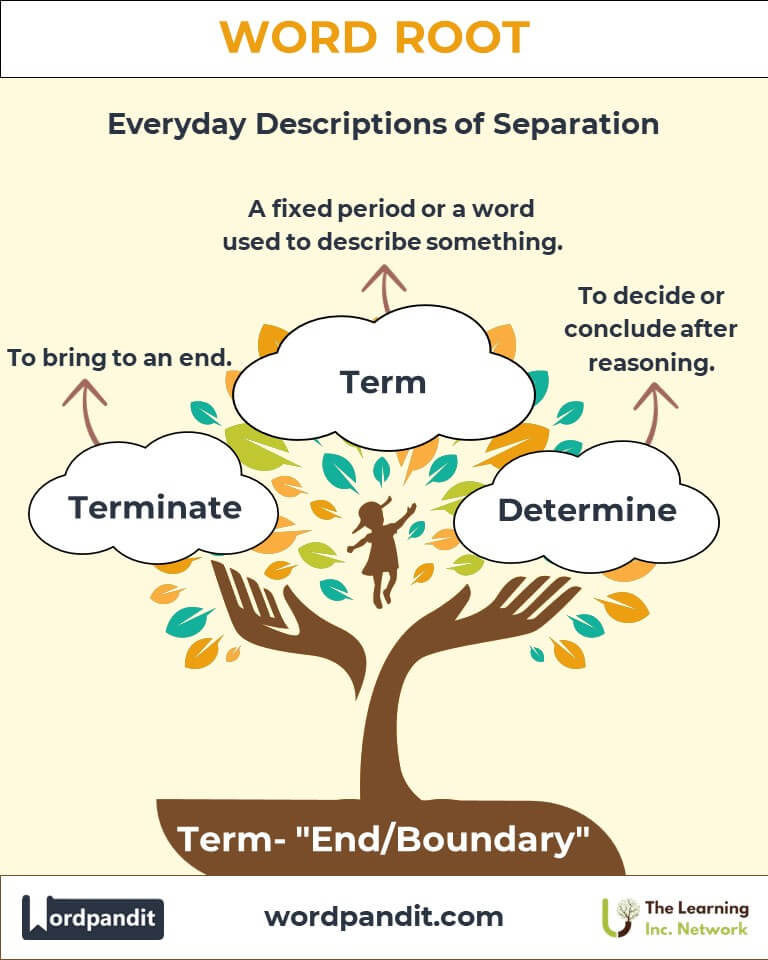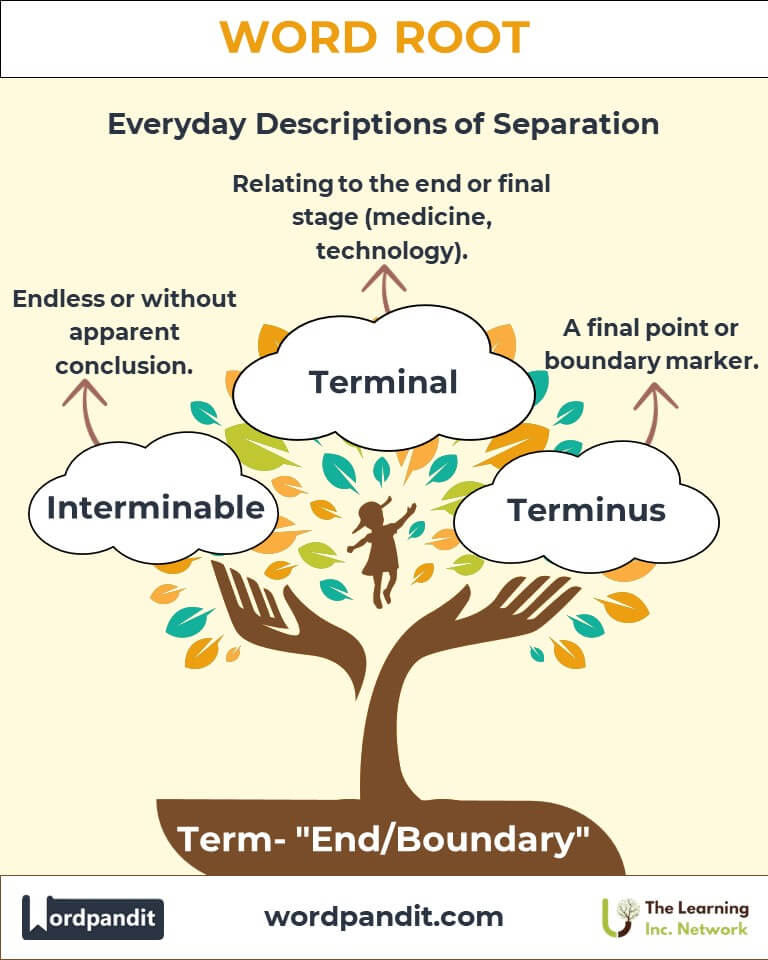Term: The Root That Defines Endings and Boundaries in Language
Byline: Explore the significance of the root "term," derived from Latin, meaning "end" or "boundary." From "terminate" to "determine," this root reveals the power of defining limits, conclusions, and decision-making in language and thought.

Table of Contents
- Introduction: The Essence of "Term"
- Etymology and Historical Journey
- Mnemonic: Unlocking the Power of "Term"
- Common "Term"-Related Terms
- "Term" Through Time
- "Term" in Specialized Fields
- Illustrative Story: "Term" in Action
- Cultural Significance of the "Term" Root
- The "Term" Family Tree
- FAQs About the "Term" Word Root
- Test Your Knowledge: "Term" Word Root Quiz
- Conclusion: The Living Legacy of "Term"
1. Introduction: The Essence of "Term"
The word root "term," pronounced as turm, comes from Latin terminus, meaning "end" or "boundary." It serves as a linguistic marker for defining limits, concluding events, or setting boundaries in various contexts. Whether it's ending a process (terminate) or arriving at a conclusion through reasoning (determine), this root underscores the importance of finality and precision in language.

2. Etymology and Historical Journey
The root "term" originates from the Latin word terminus, symbolizing an endpoint or boundary marker. In ancient Rome, termini were physical boundary stones demarcating land. Over time, the word evolved to represent figurative ends, limits, and even periods, influencing a variety of terms in modern languages.
3. Mnemonic: Unlocking the Power of "Term"
To remember "term," picture a finish line at a race, with the word "TERM" emblazoned across it. This image captures the essence of endings and boundaries.
Mnemonic Device: "TERM sets the end, whether it's a boundary or decision."
4. Common "Term"-Related Terms
- Terminate (tur-muh-nayt):
- Definition: To bring to an end.
- Example: "The contract was terminated due to non-compliance."
- Determine (dee-tur-min):
- Definition: To decide or conclude after reasoning.
- Example: "The judge will determine the outcome of the case."
- Term (turm):
- Definition: A fixed period or a word used to describe something.
- Example: "Her term as president lasted four years."
- Terminal (tur-muh-nl):
- Definition: Relating to the end or final stage.
- Example: "The terminal station marks the end of the train route."
- Interminable (in-tur-min-uh-bl):
- Definition: Endless or without apparent conclusion.
- Example: "The interminable lecture seemed to go on forever."
5. "Term" Through Time
- Terminus (Ancient): In Roman culture, it referred to sacred boundary markers.
- Terminate (Medieval): As English evolved, this term began to mean "bring to an end" in legal and everyday contexts.
- Interminable (Modern): This term shifted from a literal endlessness to describing anything tiresomely long.
6. "Term" in Specialized Fields
- Law:
- Determine: Used in legal judgments to settle disputes or claims.
Example: "The court determined the rightful owner of the property."
- Determine: Used in legal judgments to settle disputes or claims.
- Medicine:
- Terminal: Refers to illnesses with no cure, marking the end stages of life.
Example: "Palliative care supports patients with terminal illnesses."
- Terminal: Refers to illnesses with no cure, marking the end stages of life.
- Technology:
- Terminal: Refers to endpoints in a network or system.
Example: "The computer terminal allowed remote access to the server."
- Terminal: Refers to endpoints in a network or system.
7. Illustrative Story: "Term" in Action
Sophia, a young scientist, was tasked with determining the boundaries of a protected forest area. Using satellite imagery, she marked termini to define the land. The task taught her the importance of precision and the power of setting clear boundaries to protect nature.
8. Cultural Significance of the "Term" Root
The root "term" reflects humanity’s need to define and understand the world through boundaries and conclusions. From Roman boundary stones to modern legal decisions, this root encapsulates our pursuit of clarity, order, and resolution.

9. The "Term" Family Tree
- Fin (end):
- Final: Relating to the end.
Example: "The final chapter of the book revealed the mystery." - Finish: To complete something.
Example: "She worked hard to finish the project on time."
- Final: Relating to the end.
- Lim (boundary):
- Limit: A boundary or restriction.
Example: "The speed limit on this road is 50 mph." - Eliminate: To remove or end.
Example: "They worked to eliminate inefficiencies in the process."
- Limit: A boundary or restriction.
- End (Old English):
- Endurance: The ability to last until the end.
Example: "His endurance during the marathon was impressive."
- Endurance: The ability to last until the end.

10. FAQs About the "Term" Word Root
Q: What does "term" mean, and where does it come from?
A: The root "term" means "end" or "boundary." It comes from the Latin word terminus, which originally referred to boundary markers used in ancient Rome to demarcate land. Over time, it evolved to represent figurative and literal conclusions, such as ending processes or defining limits.
Q: How is "terminate" related to "term"?
A: "Terminate" means to bring something to an end. It directly derives from the root "term," reflecting the idea of reaching a final boundary or stopping point. For instance, a terminated contract is one that has reached its conclusion or been officially ended.
Q: Why does "determine" mean to decide?
A: "Determine" involves coming to a decision or conclusion after reasoning. It stems from the concept of setting boundaries on a problem or narrowing down possibilities to a definitive endpoint, much like marking a clear boundary.
Q: Is "terminal" always negative?
A: Not always. While "terminal" can refer to the final stages of a disease, it also describes endpoints in transportation (like bus terminals) and technology (computer terminals), where it simply signifies the conclusion of a route or process.
Q: What does "interminable" mean, and how is it used?
A: "Interminable" means something that seems endless or excessively long. The prefix "in-" negates "term," creating a sense of something without an end. For example, an "interminable lecture" feels like it will never conclude.
Q: How is the root "term" used in law?
A: In legal contexts, "term" appears in phrases like "determine liability" (decide or conclude responsibility) or "term of contract" (a defined duration). These uses emphasize the importance of boundaries and clarity in legal agreements.
Q: What is the significance of "terminus" in ancient culture?
A: In ancient Rome, terminus referred to sacred boundary stones that marked property lines. They symbolized the importance of defining ownership and order in society, influencing the modern metaphorical uses of "term."
11. Test Your Knowledge: "Term" Mastery Quiz
1. What does the root "term" signify?
2. Which term means "to bring to an end"?
3. What does "interminable" describe?
4. What is a "terminal" in technology?
5. What was the original meaning of "terminus"?
12. Conclusion: The Living Legacy of "Term"
The root "term" continues to define boundaries and conclusions across languages and disciplines. Its enduring legacy highlights humanity’s quest for clarity and structure. As we embrace new challenges, the power of "term" reminds us of the importance of setting limits and achieving resolutions.












